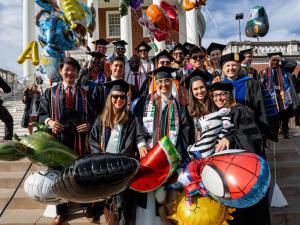Academics
When mechanical and aerospace engineers approach their research, they often begin with the same questions — “How does this work?” and “How can I make it better?”

Our educational mission is to educate students to apply advanced principles of physical sciences, mathematics and engineering to solve challenging multidisciplinary problems; to empower the students with world-class research and the ability to teach themselves to solve future engineering problems of our nation; and to develop socially-conscious, business-savvy, informed, articulate, and transformative leaders of the profession, academia, and society as a whole.
Mechanical engineering is one of the oldest, largest and broadest engineering disciplines. Aerospace engineering, a newer field by comparison, is highly specialized yet widely diverse. Nonetheless, when mechanical and aerospace engineers approach their research, they often begin with the same questions — “How does this work?” and “How can I make it better?”
Using the principles of energy and mechanics, knowledge of materials and command of modern computational tools, mechanical engineers design, analyze, optimize and manufacture machines and devices of all types — from turbomachinery to microelectronics to orthopaedic devices. Similarly, aerospace engineers develop innovative technologies specific to aviation, defense systems, space exploration and other diverse fields.
Aerospace engineers are involved in such varied and exciting activities as creating the future aircraft, combiustion, sending a spacecraft to Mars and improving tomorrow’s automobiles. From artificial hearts to jet transportation to nano-engineered devices, mechanical and aerospace engineers have a tremendous impact on our everyday lives — and on the future.
Our Programs
-
Undergraduate Programs
We offer bachelor of science degrees in both mechanical and aerospace engineering.
-
Graduate Programs
We offer M.E., M.S., and Ph.D. programs in mechanical and aerospace engineering, as well as an online M.E. through the Virginia Engineering Online program.
Get in Touch
Upcoming Events
See All Events-
Time: 1:00 PM - 5:00 PMLocation: Rice 130 and Davis Commons
-
Time: 3:00 PM - 4:30 PMLocation: Rice 130 and Davis Commons




